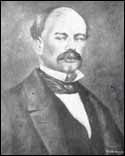
Daniel Decatur Emmett

Daniel Decatur Emmett |
||
The winter of 1842-43 would prove to be a pivotal point in the young musician's life. Emmett joined forces with three other minstrels -- Frank Brower, Billy Whitlock, and Dick Pelham -- to form a group known as "The Original Virginia Minstrels" (Emmett on fiddle, Brower on bones, Whitlock on banjo, Pelham on tambourine). Their public debut came at New York's Bowery Amphitheater on February 6, 1843. Dressed in bizarre outfits, sporting blackface, and performing original songs such as Emmett's Old Dan Tucker, the group's unique musical style and appearance were an immediate hit and were being copied nationwide within a matter of months. Unfortunately, the genre that they spawned lived longer than the group itself. A year later, following a concert tour of Great Britain that brought in next to no money, members of the band went their separate way.s
No stranger to career reversals, Emmett bounced back almost immediately, joining Bryant's Minstrels in New York. It was during his stint with Bryant's in 1859 that he composed Dixie's Land, his most enduring and controversial song. Written as a walkaround (a section of the show during which each performer walked several times around the inside of a semicircle in which his fellow performers were seated and then did his particular specialty in the center of the stage), it was an instant hit on both sides of the Mason-Dixon Line. Once it was played at Jefferson Davis's first inauguration in Montgomery, Alabama, however, it become inextricably identified with the South and was no longer heard in Northern music halls except as an anti-Southern parody. Needless to say, Emmett -- a thoroughgoing Unionist -- was not pleased.
After the war, Dixie's Land regained its old popularity up north, and Emmett resumed performing his signature tune before wildly enthusiastic crowds in the early 1880's with Leavitt's Gigantean Minstrels. Emmett continued to make public appearances until the age of 80; following a final tour through the South with Al Field's troupe, he returned to Mount Vernon, where he died on June 28, 1904.
This page is http://civilwarpoetry.org/authors/emmett.htm
Last modified 16-April-2001